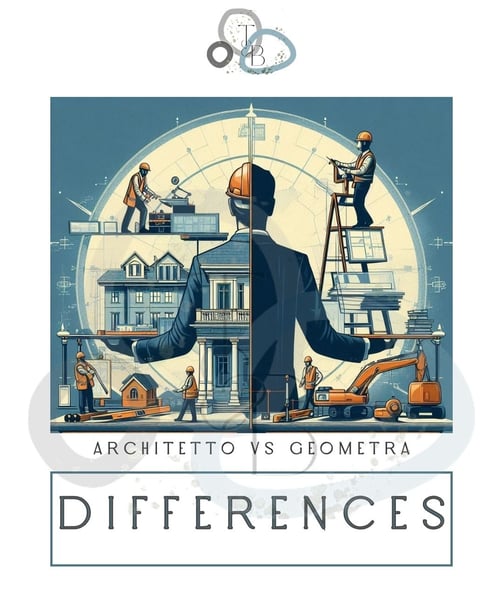We believe that every house has a story to tell. Let us help you write yours.
ARCHITETTO vs GEOMETRA _DIFFERENCES_
This guide provides an in-depth comparison to help you make informed decisions when navigating the Italian real estate and renovation landscape.
PROPERTY & RENOVATION INSIGHTS
Arch. R. Franco
2/8/20253 min read


Architect vs. Geometra: A Comprehensive Comparison of Roles and Responsibilities
When purchasing a property in Italy—especially one requiring renovation—understanding the roles of different professionals involved in the process is crucial. Among them, architects and geometri (surveyors) play distinct yet complementary roles. While they often collaborate, their responsibilities, qualifications, and legal authority differ significantly.
This guide provides an in-depth comparison to help you make informed decisions when navigating the Italian real estate and renovation landscape.
The Architect: A Highly Qualified Design and Planning Professional
Full Scope of Work
An architect has the educational background, training, and legal authority to carry out all tasks that a geometra can perform, including:
Land surveys and site measurements
Land registry documentation (Catasto)
Simple building design and construction supervision
Expanded Scope of an Architect
Beyond these fundamental tasks, an architect can:
Design complex structures such as high-rise buildings, large-scale infrastructure, and public spaces.
Restore and conserve historic or protected buildings, ensuring compliance with strict regulatory frameworks.
Plan and design urban developments, including zoning regulations, landscaping, and large-scale planning initiatives.
Incorporate aesthetic and functional considerations into a project, balancing creativity with structural and regulatory requirements.
Oversee large-scale renovations, integrating sustainability and modern architectural solutions.
Manage the entire renovation process, from feasibility studies to execution, ensuring all bureaucratic and technical aspects are handled professionally.
The Geometra: A Technical and Operational Specialist
Limited Scope of Work
A geometra is a technical professional specializing in the practical and administrative aspects of construction and real estate transactions. Their role includes:
Surveying and cadastral documentation
Managing land registry updates and measurements
Overseeing the construction of small-scale projects (e.g., low-rise buildings, extensions, minor renovations)
Handling permit applications and compliance checks
Legal Limitations
Unlike an architect, a geometra is not authorized to:
Design or oversee complex or structurally challenging buildings.
Work on protected or historic properties, which require an architect or engineer.
Engage in urban planning, zoning, or advanced architectural design.
Conduct structural calculations for major alterations or new constructions.
Why an Architect Has a Broader Scope of Work
Education and Training
Architects undergo a rigorous five-year Master’s degree program that includes:
Structural engineering principles
Advanced architectural design
Urban planning and zoning laws
Historical preservation and conservation techniques
Sustainable building solutions
By contrast, geometri follow a shorter, more technical education path, typically a technical high school diploma (or a three-year specialized degree), focusing on operational and administrative aspects rather than complex design or engineering.
Professional Qualification and Licensing
To become a licensed architect in Italy, professionals must:
Complete an internship period
Pass the State Examination (Esame di Stato)
Register with the National Council of Architects (CNAPPC)
This process ensures that architects are equipped to handle projects of any complexity, from private residences to urban planning initiatives.
Geometri, on the other hand, obtain their qualifications through a more streamlined process, allowing them to work in technical capacities but restricting them from advanced design and planning roles.
Legal Framework and Authority
Italian law explicitly reserves certain professional responsibilities for architects or engineers, including:
The restoration of historic and protected buildings
The design and execution of complex architectural projects
Urban planning and large-scale development initiatives
These tasks fall outside the legal jurisdiction of geometri, further solidifying the broader professional scope of an architect.
Collaboration Between Architects, Geometri, and Engineers
While architects have a more comprehensive scope of work, they often collaborate with geometri and engineers to ensure efficiency and compliance. Many architectural firms in Italy employ geometri and engineers as part of their teams, with each professional contributing specialized expertise:
Geometri manage technical documentation, land registry updates, and permit applications.
Engineers handle structural calculations, mechanical systems, and large-scale construction methodologies.
Architects lead design, planning, and aesthetic considerations, ensuring that projects align with both functional and artistic visions.
This interdisciplinary approach optimizes project execution, particularly for large-scale or complex renovations.
Key Recommendation: Hire an Architect Before Purchasing a Property
If you are considering purchasing a property in Italy, particularly one that requires renovation, it is highly advisable to engage an architect from the outset. Here’s why:
Legal and Technical Due Diligence: An architect can verify that all property documentation is accurate, flagging any legal or structural issues before purchase.
Feasibility Assessment: Architects can assess whether the desired modifications are legally and structurally possible, preventing costly surprises post-purchase.
Maximizing Property Potential: With their expertise in design and planning, architects can offer strategic advice on renovations, ensuring the best use of space and resources.
Regulatory Compliance: Italian bureaucracy can be complex; an architect will navigate zoning laws, building codes, and permit applications efficiently.
While geometri play an essential role in the process, only an architect can provide a holistic evaluation, making them the best choice for anyone considering a property investment or renovation in Italy.
Conclusion
An architect has the qualifications, legal authority, and expertise to perform all the duties of a geometra and much more. The reverse is not true: geometri are limited to technical and operational roles. When purchasing a property in Italy, prioritizing the engagement of an architect ensures a smooth and legally compliant process, reducing risks and optimizing the investment.
For anyone looking to purchase and renovate property in Italy, the best approach is to hire an architect first, who can then collaborate with geometri and engineers as needed, ensuring that the entire process—from due diligence to renovation—is handled professionally and efficiently.
Trulli and Beyond - Your Guide to Buying and Restoring Property in Italy
